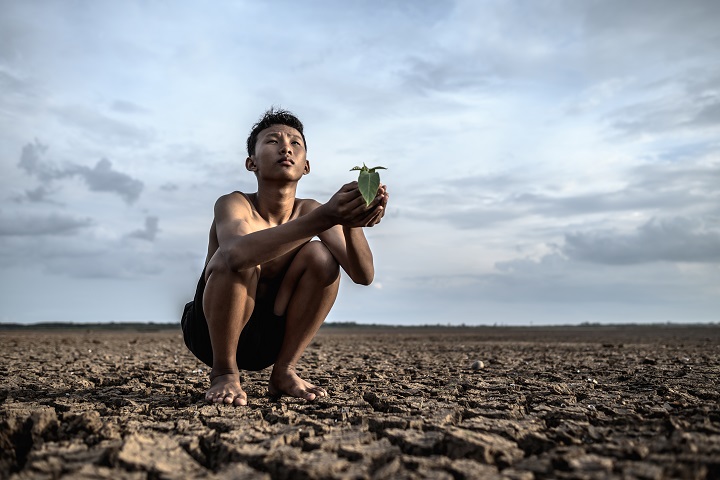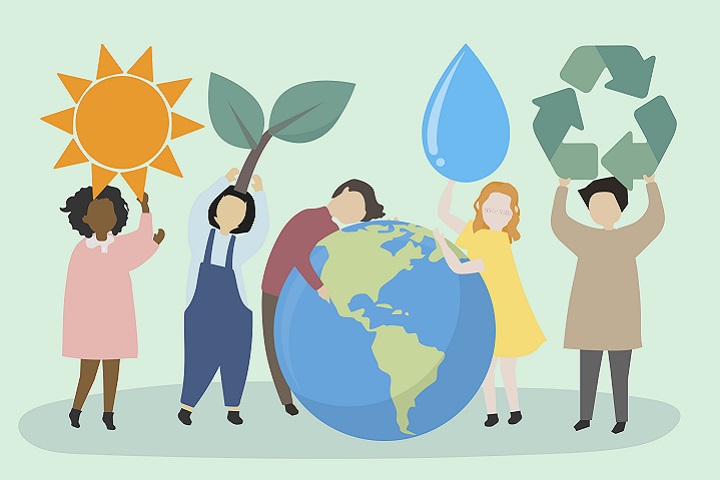The seas, which cover 71% of our blue planet, currently absorb so much CO2 generated by human activities that the temperatures of the sea waters are endangering many organisms, the changes in the marine environment affect the beings that live in the water, such as corals and the species that depend on them.
Sea level rises are changing coastlines and undermining buildings, posing a risk to human life, demand for water will have grown 55% by 2050 due to overpopulation, frozen freshwater in the Arctic, in Greenland, in Antarctica and in all the alpine regions of the world they are melting, all this is ending up in the oceans, rivers and soils of the entire planet. Initially that water will fill the rivers and river basins, but as there is less ice, the waters of the drains, and the fresh water available, will also be reduced. If measures are not taken for these there will be water restrictions and that would lead to a severe drought. The oceans help modulate CO2 levels and maintain global temperatures, while also transporting nutrients and harboring marine ecosystems.
Among the main causes of water scarcity is the excessive consumption of natural resources and human overpopulation. … Pollution: In many cases, the problem is not the lack of water, but the deposits such as aquifers, lakes, rivers, and dams, are contaminated.

The scarcity of water in the world is a problem that can increase and that produces serious consequences such as the following:
Diseases. The scarcity of water and the lack of adequate purification systems force us to resort to contaminated water sources that can cause diseases. Based on data from the World Health Organization, it can be stated that contaminated water can transmit diseases such as diarrhea, or poliomyelitis. Water contamination causes more than 502,000 deaths from diarrhea each year. In addition, the lack of water can cause dehydration and generate further complications.
Hungry. Water scarcity can affect agriculture, livestock and industry and therefore cause food shortages and hunger.
Disappearance of plant species. Plants need a large amount of water to develop and when water is scarce, they dry up and disappear.
Conflicts. The scarcity of resources is at the origin of many conflicts in the world and involves the displacement of people to other countries to find safe places to live.
Water scarcity is a global problem that has very serious consequences for both the environment and people. Water for refugees is also a scarce resource and it is in our power to take care of it and not waste this resource that is so necessary for life.
Society needs to realize the importance of natural resources in the survival of the species and the planet. In recent years, a social awareness in favor of the environment has been generated and fortunately this trend is increasing. It is important to continue encouraging the new generations to take care of natural resources and know how to make the most of them.

In addition to being informed about the problem, there are several actions that can be carried out to combat the causes of water scarcity and if each person carries them out, the change will be noticeable.
Do not waste it: It is very important to make the most of every drop, so in addition to turning off the tap when it is not being used directly, you should also ensure that the appliances and technology used in the home are economical. That is, that the toilets use smaller tanks that release less water in each discharge, that the showers are regulated and that appliances such as dishwashers and clothes washers use less water. As well as using this resource correctly, another way to combat water waste is to check the pipes and give them constant maintenance to ensure that there are no water leaks or filtrations.
Report water leaks: If you are walking down the street and you realize that there is water coming from somewhere, try to locate where it is coming from and if it cannot be stopped, immediately report the leak to the authorities.
Collect rainwater: Another way to combat the causes of water scarcity is to find new sources that can provide this resource, and rain is one of them. In the Rotulas product catalog you can find a system designed to take advantage of rain and provide water for human consumption through collection, storage, and use. Through gutters that are installed on the roof of a building, rainwater is collected and transported to a container where it is filtered and stored. This rainwater harvesting system offers a comprehensive solution to provide good quality water that is available at any time. This is a sustainable solution since it takes advantage of the regular cycle of this natural resource without additional energy expenditure and being friendly to the environment. Rainwater has been used very little but with this system, it can be used for all household activities.
At IC Corporation we contribute with projects dedicated to contributing to water sustainability through rainwater harvesting. Equitable access to water and the reduction of inequality is possible by capturing natural resources such as rain.

IC INTERNATIONAL GROUP
Copyright © 2024. Todos los derechos reservados
to save your favourite homes and more
Log in with emailDon't have an account? Sign up
Enter your email address and we will send you a link to change your password.
to save your favourite homes and more
Sign up with emailAlready have an account? Log in